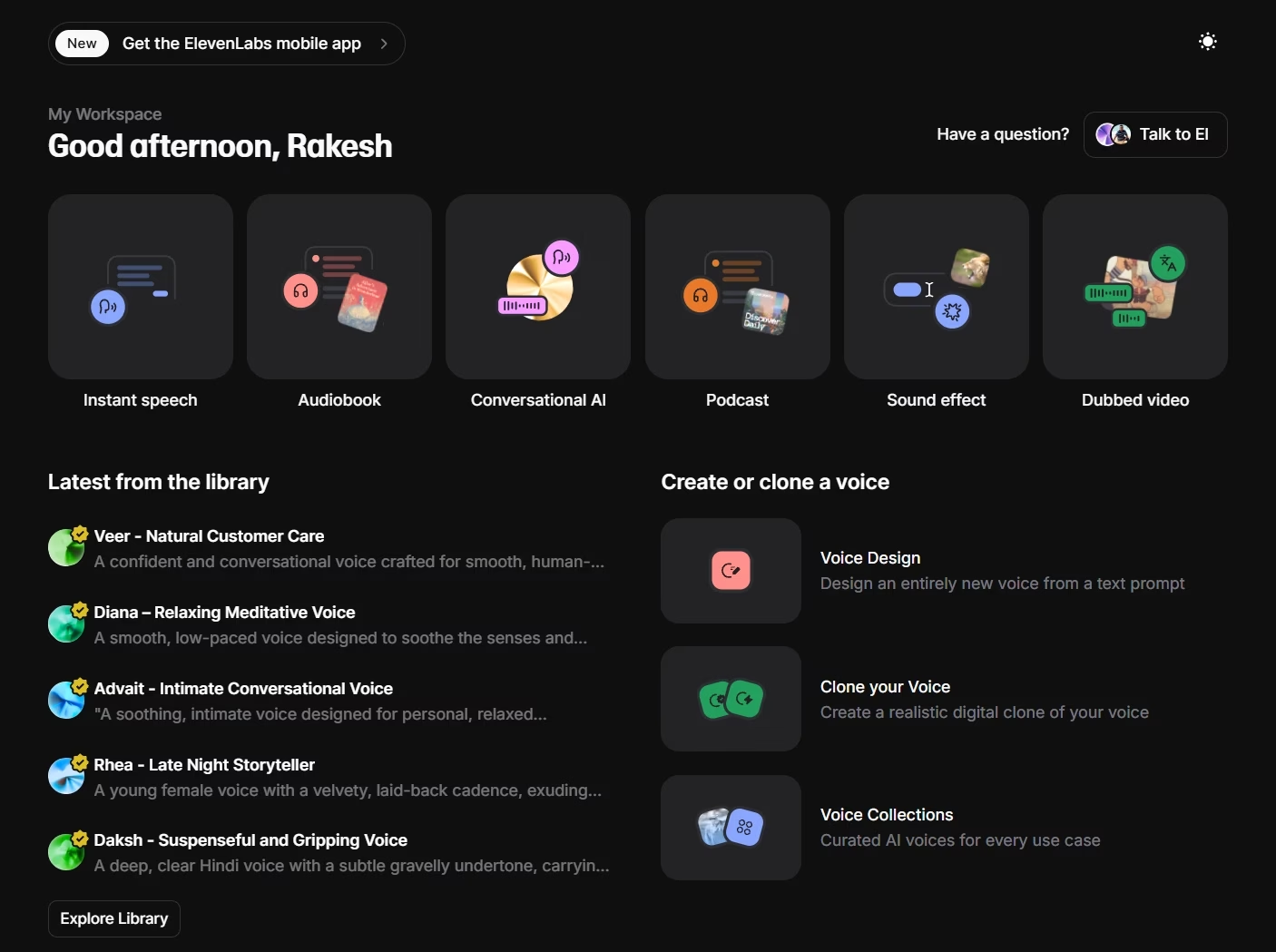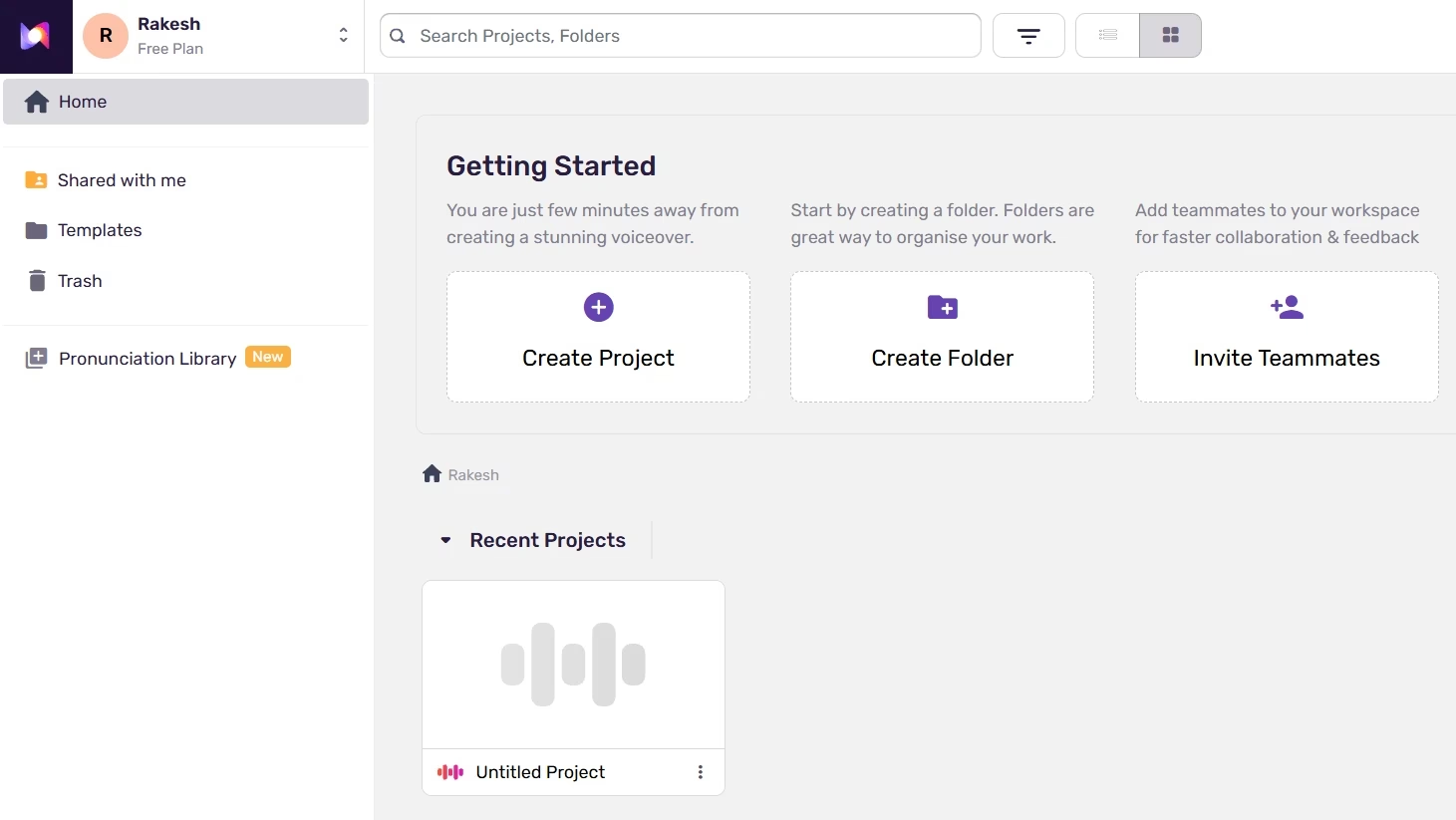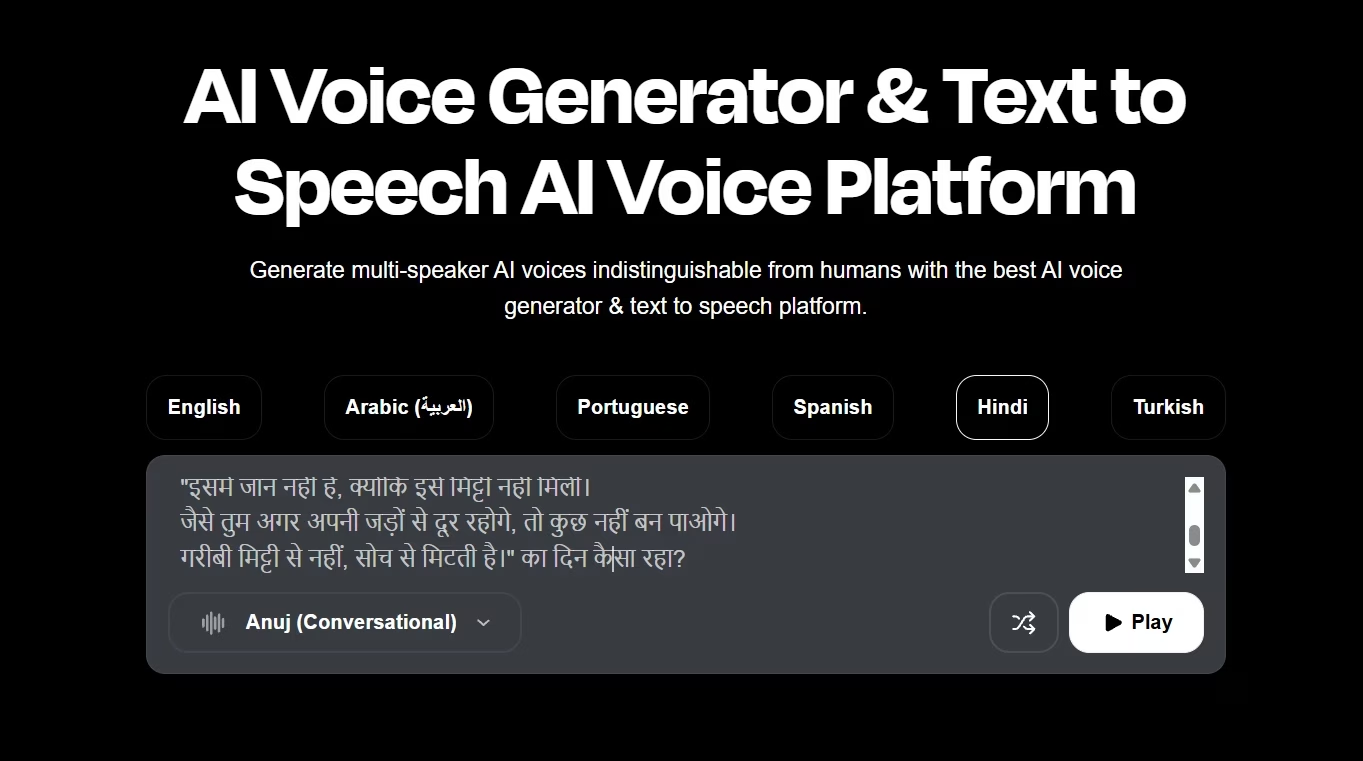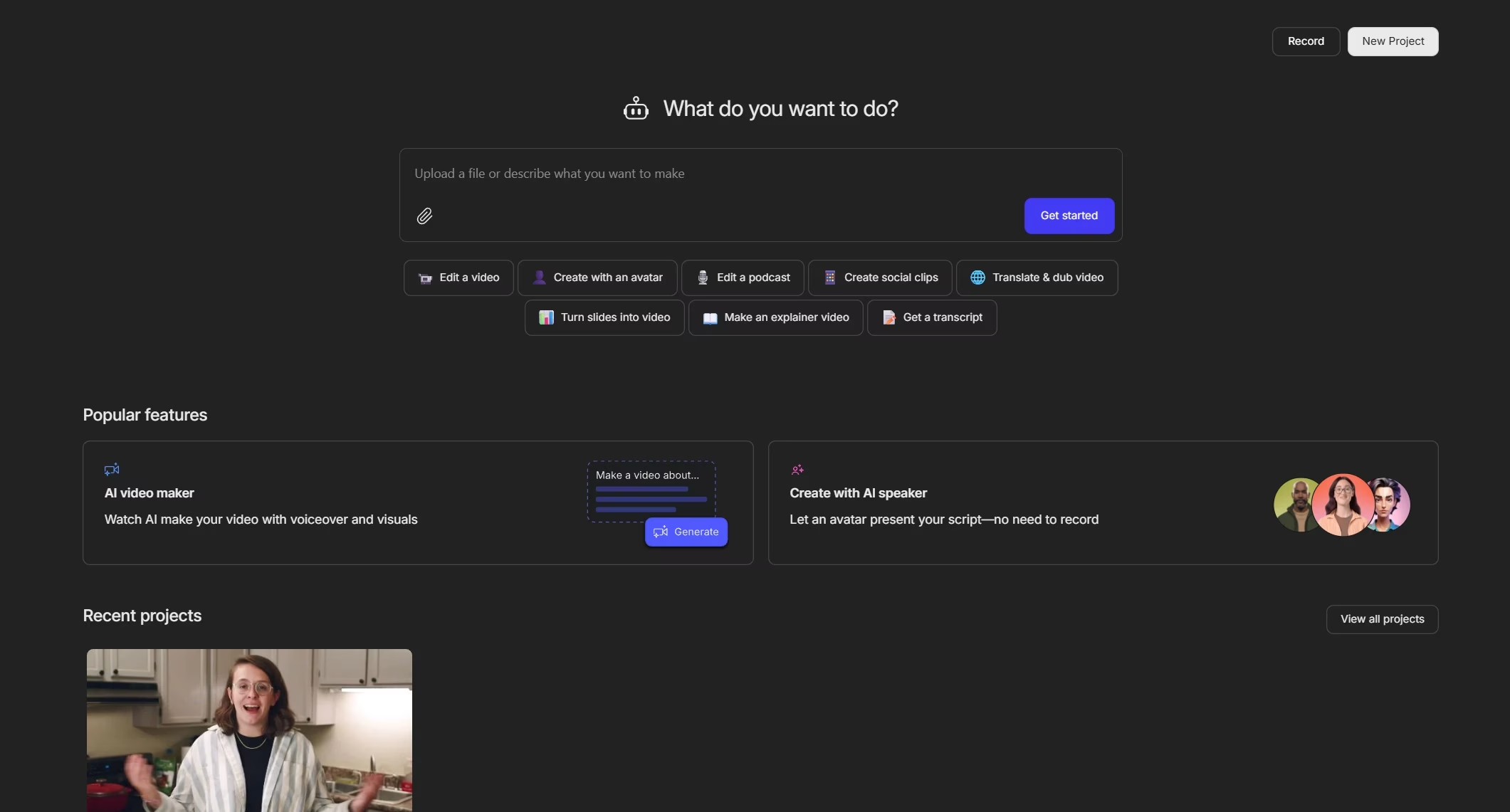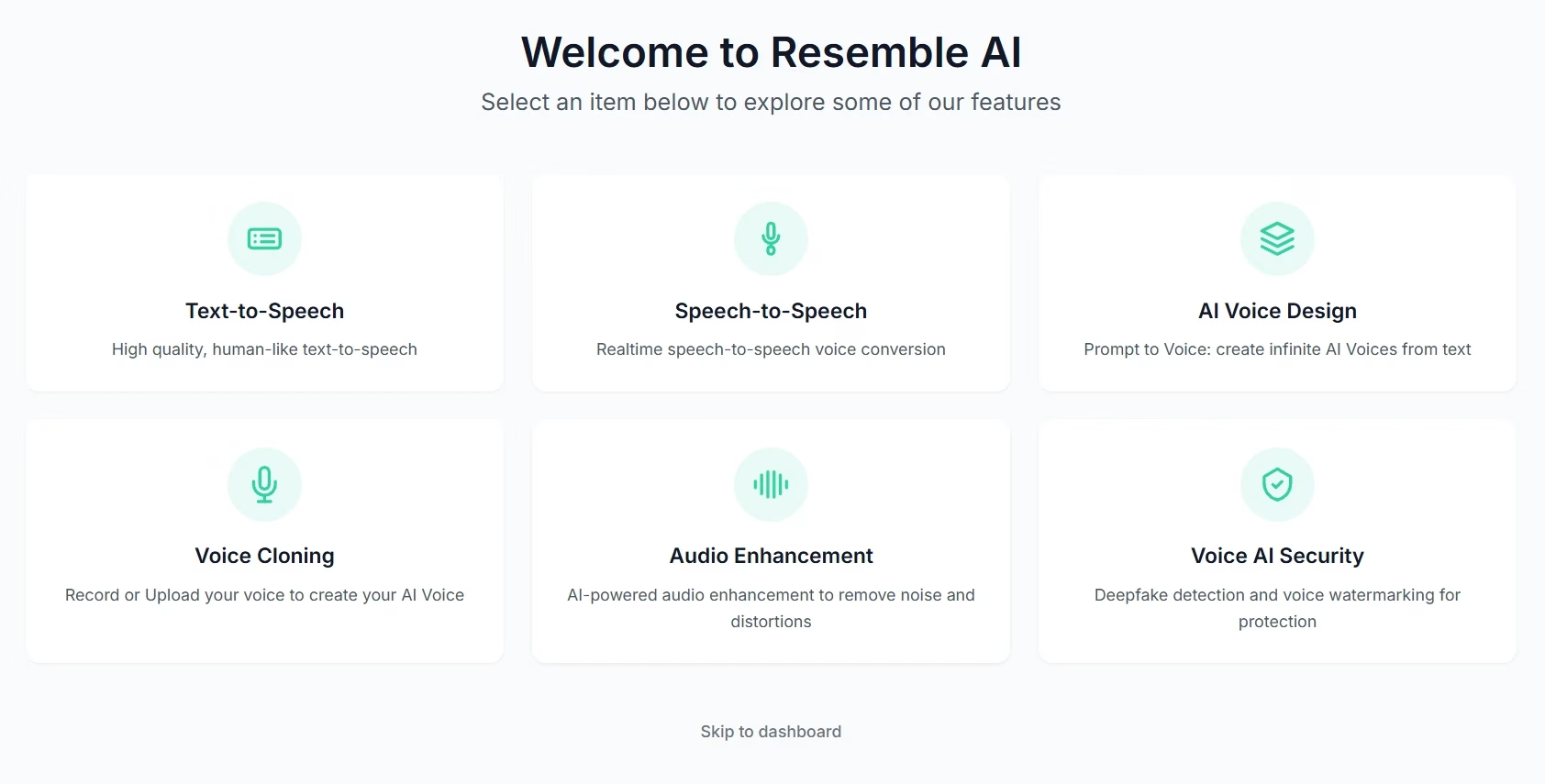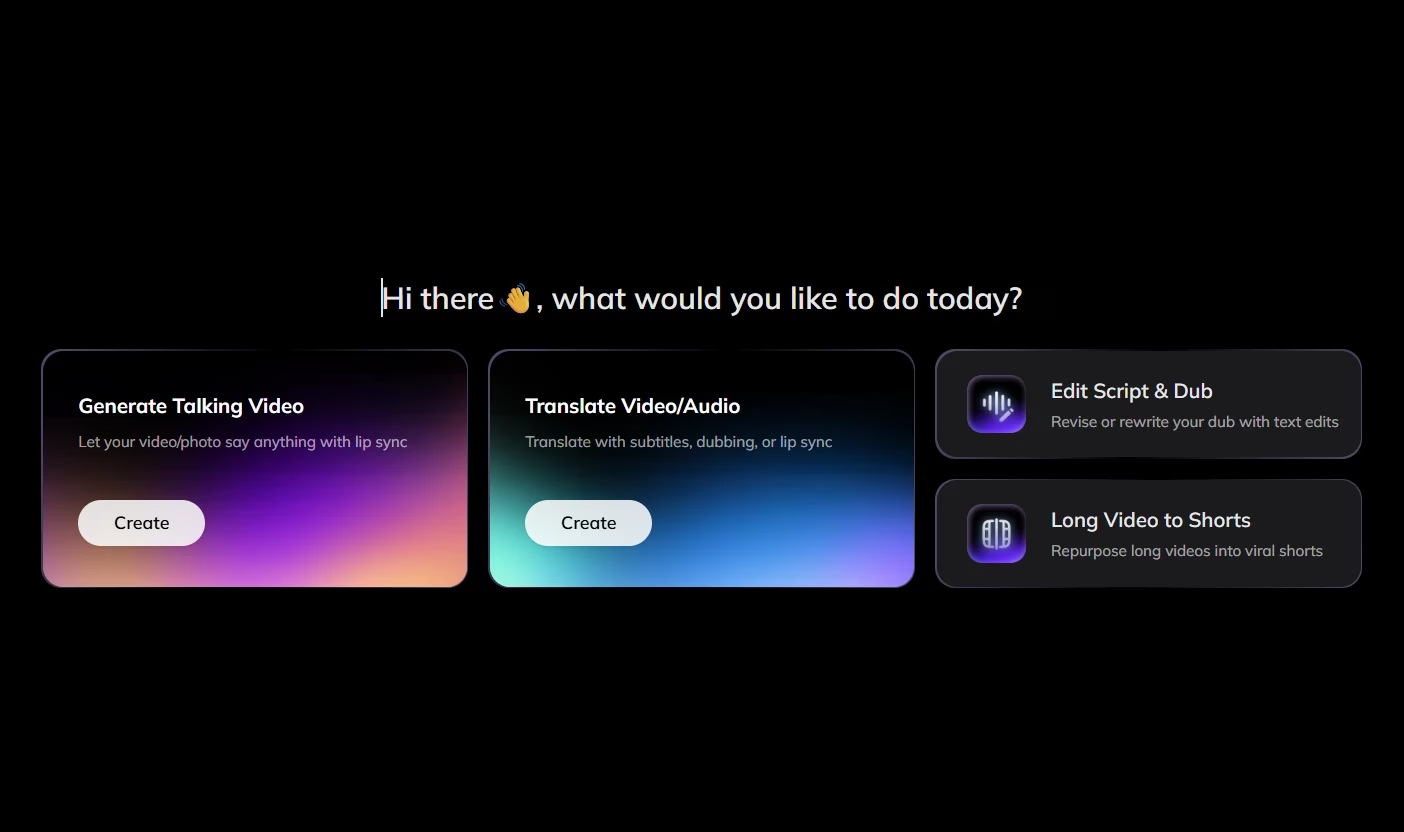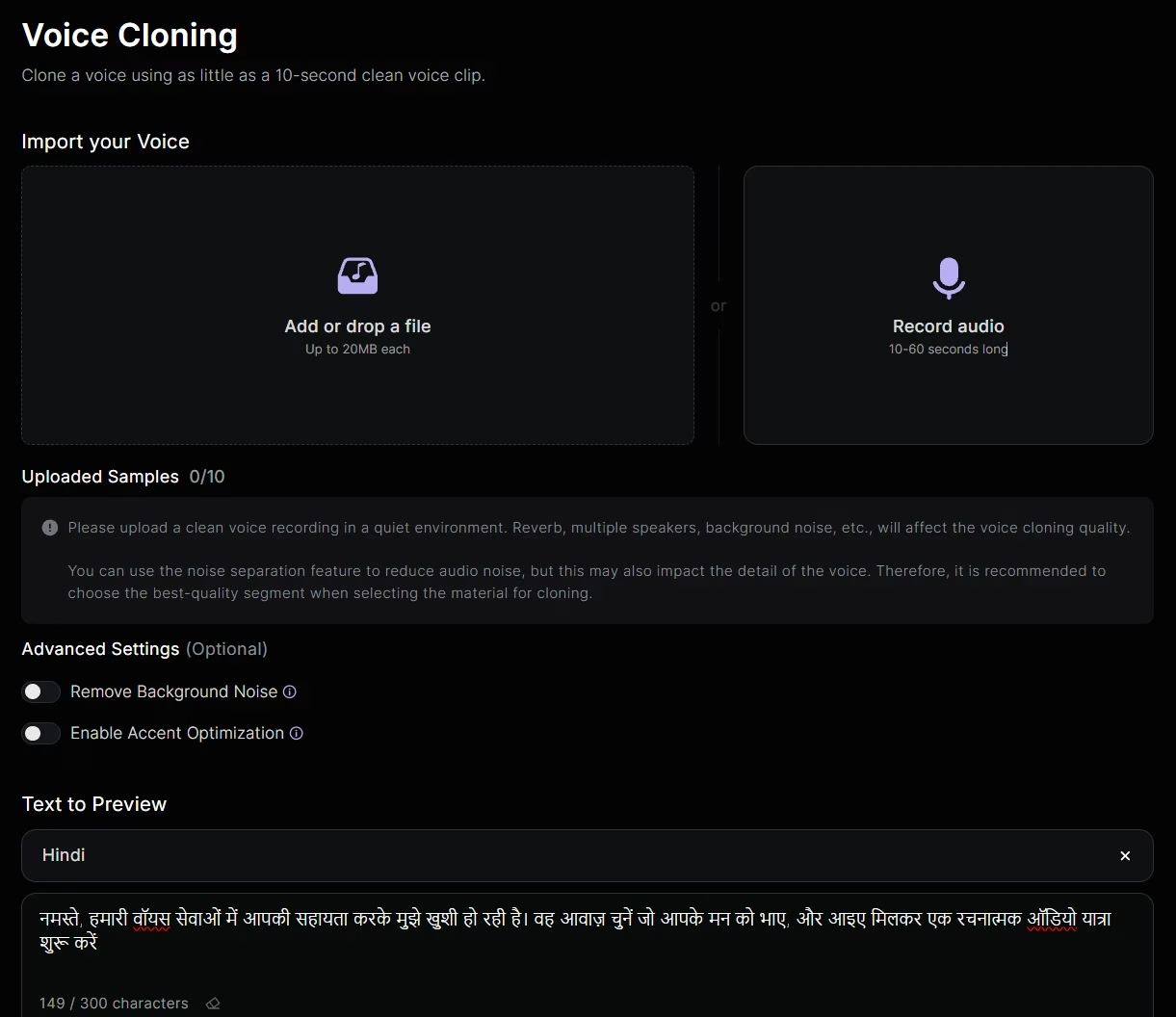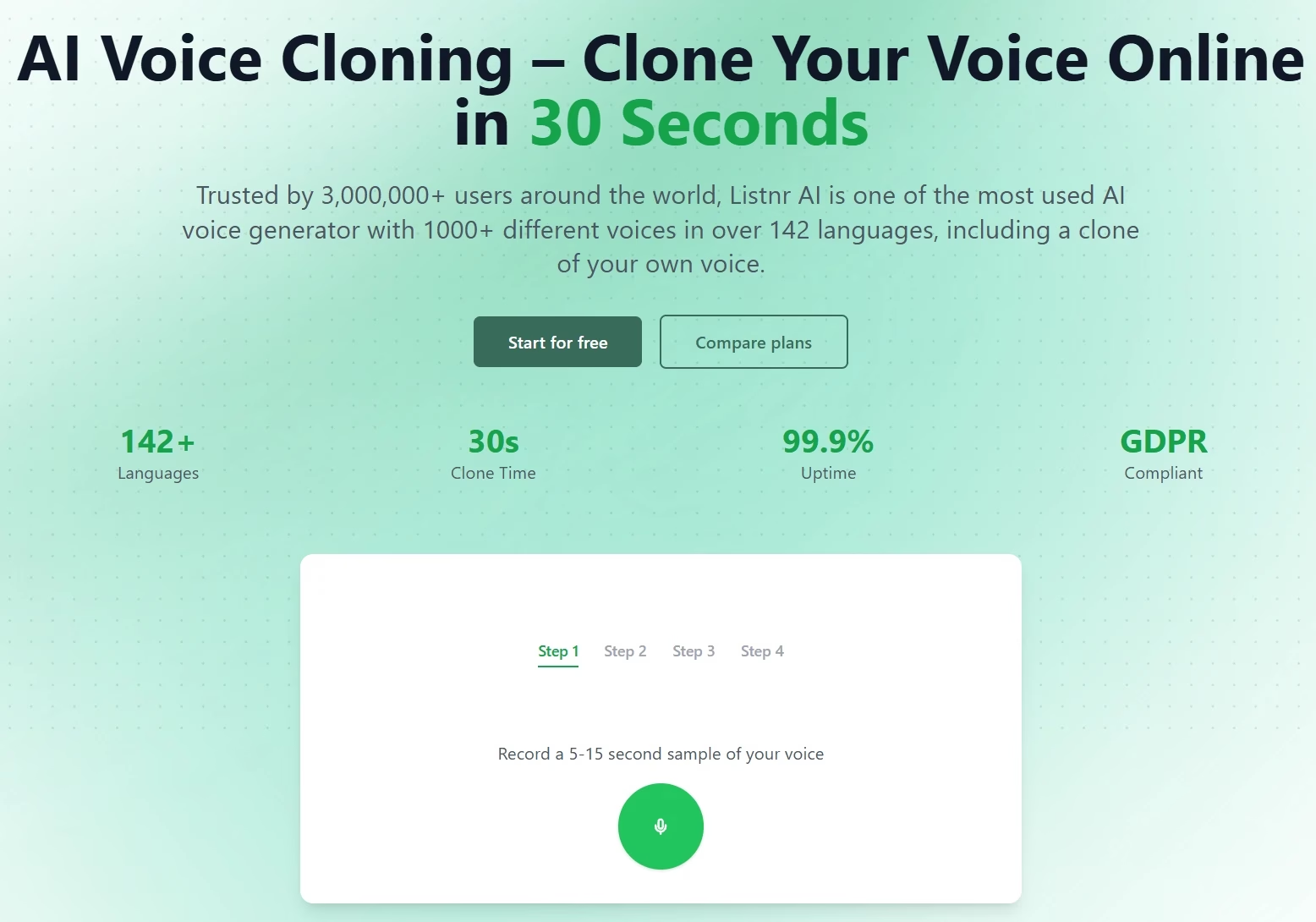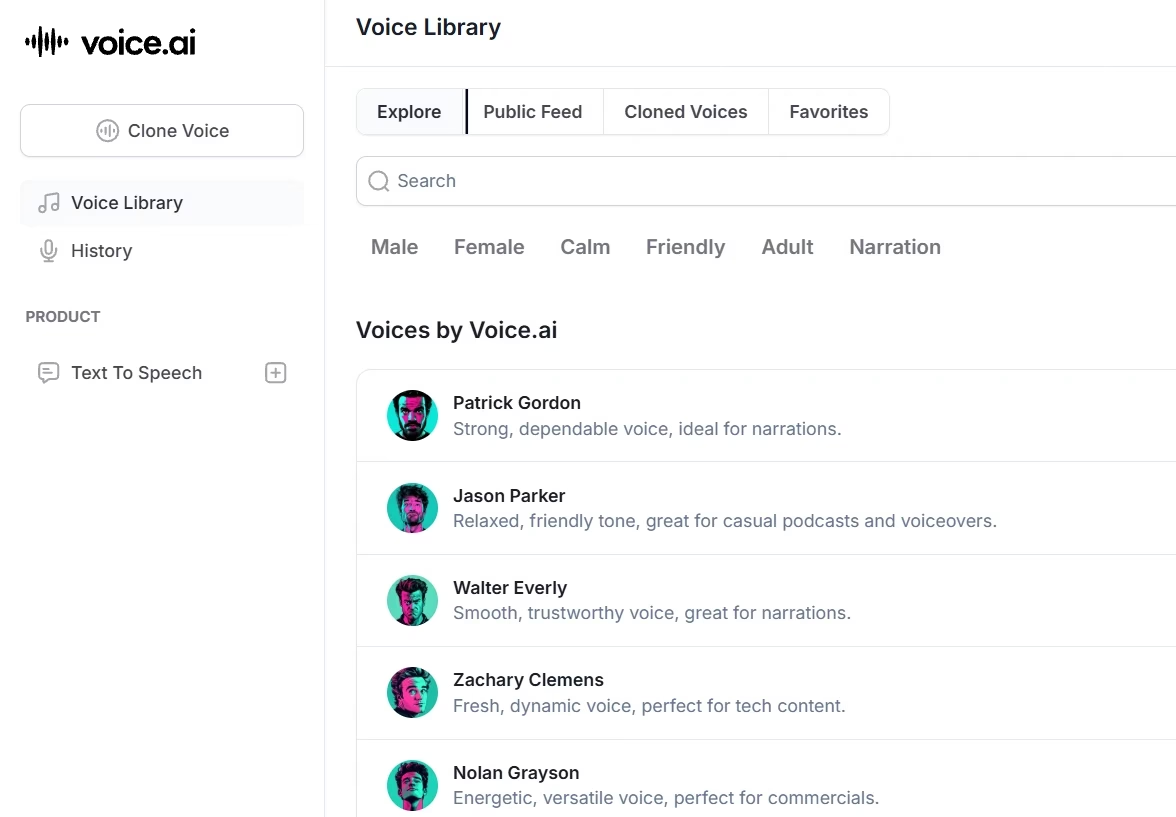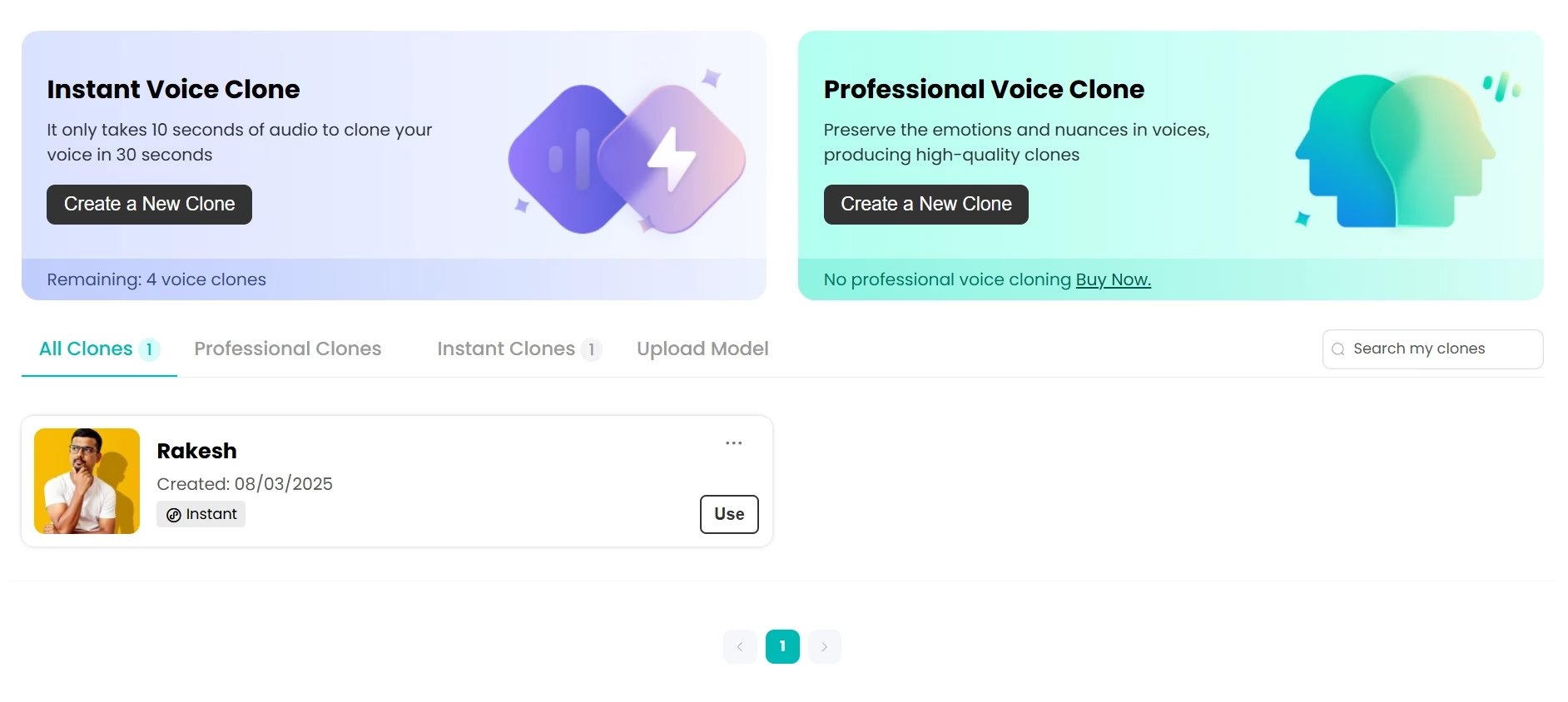Voice cloning is not just about creating robot-sounding copies, but about making voices that are unique, expressive, multi-lingual, and deeply personal. Below, you’ll find a detailed, balanced look at ten must-try voice cloning tools of 2025. For each, you’ll get not only the features and standout uses, but also an honest breakdown of their strengths and areas for improvement.
1. ElevenLabs
ElevenLabs‘s voice cloning technology sets the industry standard for hyper-realistic synthetic voices. It produces speech so natural that most listeners can’t tell it apart from real human voices. With advanced context understanding, emotional expression controls, and ultra-low latency, it enables dynamic and lifelike voice interactions.
ElevenLabs also offers rapid voice cloning from short audio samples. It lets users fine-tune pitch, tone, expressiveness, and regional accents across more than 70 languages. Its versatility makes it ideal for a wide range of applications, including audiobooks, accessibility tools, content creation, and voice restoration. In addition, robust APIs and SDKs make it easy for developers to integrate this technology into their workflows and automate processes.
Pros:
- Exceptional voice quality and realism
- Super-fast cloning (as little as 3 seconds)
- Rich emotional/style controls
- Multi-language and accent support
- Secure moderation tools
Cons:
- Advanced features may overwhelm beginners
- Some features/languages behind higher pricing tiers
- Rarely struggles with complex texts and dialects
Don’t Miss: 100 Best AI Tools to Finish Hours of Work in Minutes
2. Murf AI
Murf AI makes voice cloning simple and impressively realistic. It carefully captures emotional nuances and even subtle breath patterns to create voices that sound truly human. You can make a convincing voice clone with just 5 to 10 minutes of audio, while higher-tier plans unlock even more advanced capabilities.
The tool simplifies collaboration by combining team project management with integrations for popular platforms like Canva and slide deck apps. It also supports multiple languages and dubbing, allowing you to switch voices or accents easily and use smart localization for projects around the world.
Pros:
- 200+ natural voices
- Excellent pronunciation tuning
- Drag-and-drop, user-friendly interface
- Encrypted and compliant platform
Cons:
- Best quality behind costly enterprise plans
- Varied quality across models
- Limited integration options (in rare cases)
3. Play.ht
Play.ht AI voice technology is built to scale, offering over 900 voices in more than 100 languages. For the best results, studio-grade voice cloning uses 1 to 2 hours of high-quality audio input. You get powerful customization options, like controlling prosody, using SSML, and tweaking pronunciation to sound exactly right. Plus, it’s cloud-based and ready for real workflows, supporting batch conversions and podcast hosting to make your production smoother and faster.
Pros:
- High-fidelity voices
- Deep language and accent options
- Well-rated by industry and users
- Collaboration features
Cons:
- Best quality needs longer audio input
- Some learning curve for new users
- Certain features are paid for only
4. Descript (Overdub)
Descript makes editing audio as easy as editing text. Just change any word or sentence in the transcript, and the audio updates instantly—no need to re-record. Creators, especially podcast and video editors, appreciate how quickly they can fix mistakes and keep their workflow moving smoothly. Plus, it supports voice cloning, letting you create custom voices with full respect for consent and privacy.
Pros:
- Fix audio by editing text only
- Cloud-based, real-time collaboration
- All-in-one for audio/video plus voice
Cons:
- Free tier is limited
- Smaller language library than some competitors
- Not ideal for accent-heavy or large, multi-lingual projects
Recommended for You: 20 Best Chrome Extensions I Can’t Live Without
5. Resemble AI
Resemble AI lets you clone voices quickly and professionally. You can make a voice clone in as little as 20 seconds, or choose a studio-grade option if you have more recorded audio. It offers deepfake detection, audio watermarking, and strict privacy controls to keep your data safe and help prevent misuse. The platform also excels at localization: it preserves regional accents and supports over 120 languages, and allows you to create natural-sounding voices that truly connect with people from different parts of the world.
Pros:
- Great emotional, accent, and style control
- Developer tools and robust APIs
- Supports text-to-speech and speech-to-speech
- Transparent, ethical usage enforcement
Cons:
- Pro cloning can be more technical & time-consuming
- Interface/setup hurdles for beginners
- Not fully plug-and-play
6. Vozo AI
Vozo AI offers a fast and user-friendly AI voice cloning feature that enables anyone to create highly realistic voice replicas in just seconds. By recording a short 20-second audio clip, you can generate a cloned voice in as little as five seconds. The technology captures the original speaker’s tone, accent, rhythm, and emotional undertones, making the cloned voice sound remarkably lifelike. With Vozo’s extensive library of 300+ AI voices spanning multiple languages and emotional styles, you have the flexibility.
Pros:
- Great for multi-lingual and dubbing projects
- Beginner-friendly but deep for creative users
- Seamless localization tools included
Cons:
- Some “AI” vibe on nuanced, emotional passages
- Full control generally paid only
7. MiniMax Audio
MiniMax AI makes voice cloning fast, easy, and impressively lifelike. Using their latest technology, you can create a digital copy of a voice with just 10 seconds of audio input. The system analyzes your sample and captures unique features like intonation, emotion, and speech patterns, resulting in a voice clone with up to 99% similarity to the original. Whether you need a quick clone or want more control over pitch, speed, and expression, MiniMax lets you customize the results.
The platform supports more than 32+ languages with regional accents, allowing creators to reach global audiences. It also provides helpful features like long-form text-to-speech (for audiobooks and podcasts), emotion injection, and a user-friendly workflow. You can go for it if you’re a content creator looking for high-quality, real-sounding voice synthesis.
Pros:
- Fast cloning and easy to set up
- Keeps a unique vocal character, good for cross-lingual cases
- Flexible control over emotion and style
Cons:
- Needs a clean audio sample for best results
- The interface is less polished than the market leaders
8. Listnr
Listnr AI makes voice cloning easy and quick. You just need a 5–15 second audio sample, and you can have a cloned voice in about 30 seconds. The system captures the unique tone, style, and emotions of the original speaker, so the cloned voice sounds real and natural.
Listnr works with over 142 languages, so your voice can keep its accent and character in any language. You can also adjust the emotional feel—like making the voice sound happy or professional—and even add details like laughter. Your data stays safe with encrypted storage, and you have full control to manage or delete your voice models anytime. This makes Listnr a smart choice for marketing, creative work, or accessibility projects.
Pros:
- Very fast setup and ease of use
- Great for high-volume, multi-market creators
- Team management is built in
Cons:
- Advanced audio tweaking is not available
- Emotional subtlety is still evolving
- The free plan has tight monthly limits
9. Voice.ai
Voice.ai makes voice cloning simple and fast. You can upload a short, high-quality audio sample (15 seconds) and the system will create a realistic digital copy of the voice in seconds. The cloned voice sounds very natural, picking up on unique details like tone, accent, and inflection, so it really does sound like a real person. It’s easy to use, even if you don’t have any technical experience. Voice.ai lets you create custom voices for podcasts, video games, or voiceovers, and you can save your voice clones to use any time you need new audio—all without needing to re-record anything yourself.
Pros:
- Instant results, absolutely no technical know-how needed
- Tons of creative, fun effects
- Best for entertainment, gaming, and non-professional needs
Cons:
- Not designed for studio or commercial voice work
- Realism is good, not indistinguishable
10. FineVoice
Fine Voice AI makes voice cloning simple and quick. You only need a short, 30-second audio sample to get started, and your digital voice can be ready in seconds. The cloned voice sounds realistic and can be used right away for things like text-to-speech or changing your voice in different apps. You don’t need extra steps—just record, click, and generate. Fine Voice AI works with 149 languages. It’s an easy tool for anyone who wants a fast and natural-sounding voice copy for creative work or videos.
Pros:
- Very fast and easy—great for first-timers
- Good emotion/nuance even with short samples
- Excellent language and accent support
Cons:
- Slight robotic sound on long/emotional passages
- “Instant” voice is less natural than deep-trained options
- Occasional minor pronunciation bugs
Choosing the Best Voice Cloning Tool
Every tool here offers something unique—whether it’s ElevenLabs’ expressive realism, Play.ht’s technical flexibility, MiniMax’s zero-shot simplicity, or Listnr’s speed and ease for modern creators. Your best pick depends on what you need:
- Maximum realism and customization: ElevenLabs, Resemble AI
- Ease and fast results: Listnr, Voice.ai, FineVoice
- Advanced editing, dubbing, localization: Play.ht, Vozo AI
- Collaboration, podcasting, and multi-language support: Murf AI, Descript, MiniMax
Tip: Always seek proper permissions for voice cloning and use these tools ethically—protecting privacy and respecting the voice’s owner is as important in 2025 as ever. Whether you’re a brand, content creator, educator, or just curious, 2025’s AI voice landscape offers something for every need and ambition.
This article is based on expert analysis, user reviews, and hands-on testing with leading voice cloning tools as of August 2025.
Read Next: 350 Most Useful Websites on the Internet
